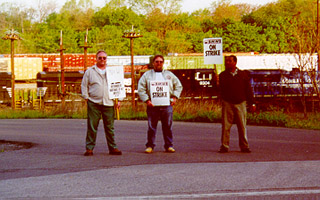|

The BMWE set up picket lines on the former Norfolk and Western
portion of the Norfolk Southern Railroad at 6:00 a.m. on Thursday, May
4, 2000. At 9:10 a.m. the same day, Judge James C. Turk of the U.S.
District Court for the Western District of Virginia issued a temporary
restraining order and the pickets came down.
The former N&W railroad represents approximately 30% of the NS
system and runs through the states of Kentucky, Maryland, North
Carolina, Ohio, Tennessee, Virginia and West Virginia. Initial pickets
were established at Columbus, Ohio; Kenova, Bluefield and Williamson,
West Virginia; Roanoke, Virginia; and Hagerstown, Maryland.
Shortly after the unprecedented layoff of 600 BMWE members on NS,
management unilaterally changed the bulletin and assignment rules in
the collective bargaining agreement between the former N&W
property and the BMWE. The agreement contains provisions which
expressly state that all vacancies and positions be announced by
bulletins containing specified information, that employees may bid for
such positions, and that such positions must be filled in seniority
order.
In recent months, notwithstanding the express requirements of the
agreement, NS has been filling positions without regard to the
seniority rights of its employees and without making the positions
available for bid. There are hundreds of furloughed maintenance of way
employees with the seniority to apply for and obtain positions that
have been filled by NS under its new practice.
The BMWE repeatedly brought the problem of abrogation of the
bulletin, seniority and assignment rules to the attention of senior NS
labor relations officials, but NS refused to cease its illegal
practice. The BMWE was left with no alternative but to strike.
"Norfolk Southern made a bad business decision when it
purchased Conrail and could not properly operate the combined
railroad," said Tom McCoy, BMWE General Chairman of the Norfolk
& Western System Division. "We have paid for this
incompetence with the layoff of our members. However, this did not
give them the right to abrogate our contract. When they began to fill
our positions without regard for our agreement, they went too far. We
had no alternative but to shut the railroad down. The alternative was
to continue to let them step all over our rights."
BMWE filed a lawsuit on May 3 in federal court in Youngstown, Ohio,
seeking to enjoin the railroad's willful refusal to apply the
requirements of the labor agreement. Although Norfolk Southern was
aware of that case, the railroad's attorneys went to Judge Turk
claiming that the dispute was really about implementation of the
Conrail carve-up and presented him with a draft temporary restraining
order. In its court papers, BMWE charged that by concealing the
existence of the other lawsuit, the railroad's attorneys persuaded the
judge to sign the restraining order, even though another court had
jurisdiction over the case.
In addition, BMWE maintained in its subsequent court papers that
the restraining order violated many requirements of the
Norris-LaGuardia Act, a federal law that is supposed to limit the
issuance of restraining orders in labor cases.
On May 12, Judge Turk issued a preliminary injunction that
continued the strike ban until the matter would again come before his
court, but after the Youngstown court could consider BMWE's motion for
an injunction on NS.
As this JOURNAL goes to press, the BMWE intends to appeal Judge
Turk's preliminary injunction, including the manner in which it was
obtained by NS. It is BMWE's position that the Judge in Youngstown has
exclusive jurisdiction over the matter and the manner in which the
restraining order and injunction were obtained from Judge Turk go far
beyond the boundaries of propriety. |

